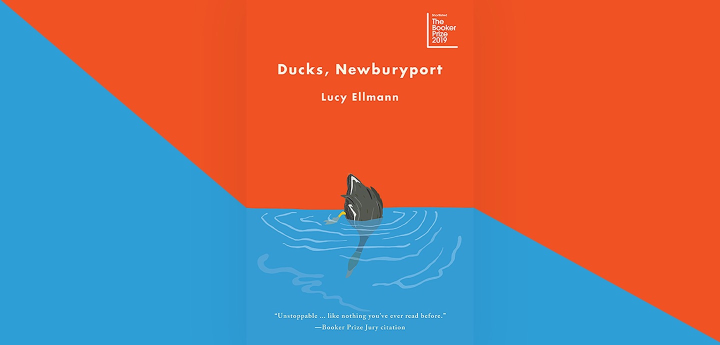
, the fact that...

[This fragment is available in an audio version.]
I’ve been reading Ducks, Newburyport by Lucy Ellmann since January of this year and finished it earlier this evening. I’ve taken breaks from it to read other books and quit my job and launch a sideline in activism. The book is over a thousand pages long and mostly composed of a single sentence, an endless flow of phrases many introduced by , the fact that… I enjoyed it a whole lot! While most people won’t be eager to wade into something this big and complicated, the fact that it’s OK to take months and months to wander through it may make the idea less intimidating. I hope to tempt you further. Also a few notes about me and books.
This thing was short-listed for the Booker and widely-reviewed; if you want to get a feeling for it you can check out any of the CBC, the London Review of Books, the New Yorker, the New York Times (and again), and The Guardian.
The Washington Post makes the point that reading a thousand-page work is physically difficult, especially if you have any age-related stiffening of the extremities. So if you are going to pick up Ducks, get it on Kindle or Kobo or some such! Your wrists will thank you.
Also from the WashPost, a good interview with the author. The following Q/A resonated with me, given my recent history: Q: “What are you trying to say about how society — and women in particular — view motherhood?” A: “I’m not trying to say anything, I’m saying it!” She’s just invested a thousand freaking pages getting her message across; questions of the “what are you trying to say?” form deserve to be pissed on from a great height. In fact, protip for interviewers: Asking any writer who’s just published something what they were trying to say is apt to get you a well-deserved grumpy response.
What the reviews don’t say · As they do say, most of the book is the somewhat overwrought and disordered internal ramblings of a woman with four children in a happy academic marriage whose family is suffering money troubles following on her cancer, and who has turned from teaching to baking to help pay the bills. Interspersed is a story about a mountain lioness’ search for abducted cubs. But they miss things that I think are important:
First, not much of any significance happens during the first 900 pages; a couple of minor family crises. Not that it’s boring, I never once felt the urge to lay it aside. But during the last 10% of the book there are significant plot outbursts, real dramatic life-and-death action.
This book is about the most American thing imaginable. While our protagonist and her husband have lived overseas, they now live in rural Ohio, and the political and business and musical and literary and shopping and weather and cultural and child-rearing and many many other issues that infuse the story are so American that I suspect anyone not infused in New World culture will miss lots of subtleties.
I talked about “many many” issues. Our narrator’s internal landscape is astonishingly, overwhelmingly, rich. Yes, the same issues and themes keep coming back, but damn are there ever a lot of them. I am old and have drunk pretty deep at the wells of culture and history but was handicapped by being weak on classic cinema and the work of Laura Ingalls Wilder (Little House on the Prairie). But time after time, a side-trip off a side-trip in Ducks would connect to something that I’d cared about after reading or hearing or living it a decade or four ago.
The principle of Chekhov’s gun applies in spades here. You have been warned.
Life is a sexually-transmitted terminal condition. It eventually kills us all and as a matter of course inflicts wounds along the way. Often we survive and enjoy post-recovery life. But never pretend that the damage isn’t permanent. No ending is ever 100% happy.
Big books · I can remember the day I learned to read; sometime in my kindergarten year National Geographic had a story on dinosaurs and my Mom found me hunched over it when she got home from work. After that I could read, and have never stopped.
I like short and medium-sized books. But I especially love big, thickly-flavored books. I suspect my feelings may have a macho component — no book is too big or too hard to defeat me! In fact, Marx’s Capital and Joyce’s Finnegan’s Wake have. But no others I can think of.
Big doesn’t have to be difficult. Ducks, Newburyport isn’t difficult at all; I read this book for pleasure and with pleasure. It’s just big, that’s all.
Comment feed for ongoing:
From: Rob Jordan (Aug 24 2020, at 02:25)
Have you ever read Independent People by Halldor Laxness? Another long book (not as long as the one you have reviewed) and it certainly has longeurs, but nonetheless a masterpiece which had me sobbing as I finished it on a plane. Recommended.
[link]
From: Paul Boddie (Aug 24 2020, at 16:17)
Sorry to get distracted by the book's cover, but who else gets the visual clash at the boundary of the two strong background colours? (And for those that get what I'm talking about, does anyone know if the phenomenon has a name?)
[link]
From: Doug K (Sep 04 2020, at 14:23)
thank you, this looks interesting if challenging..
The seam of stream-of-consciousness writing appeared to be mined out after Joyce and Woolf. A new entry a century later is bold..
I read very little modern litfic these days. As I can scarcely bear to live in the world, reading about it in my few idle hours seems supererogatory. The vastly detailed worldbuilding fantasy series of writers like Kate Elliot and Lois McMaster Bujold are a very great solace in these times.
[link]